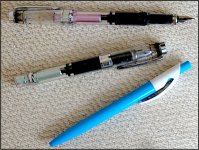What people who think of themselves as photographers (who have always take a tiny fraction of all the photographs ever taken) seem to forget is that artistic or aesthetic, let alone technical, perfection isn't what most people are after when they take photos.
All they want from a photo is a clear depiction of what they've pointed their camera/phone at. Digital makes that much easier than film because the result can be seen as soon as it has been (or even as it is being) taken. Phones make it easier still because of all the processing they do to correct 'mistakes'.
Taking photos is easier than it's ever been. But making
pictures is just as difficult. Not everyone is interested in the latter, and sadly a lot of those who claim to be get hung up on the intricate details of the process and forget to see the bigger picture (pun intended).
St Ansel said something far more worth remembering than anything about cameras, it was to do with sharp photos and fuzzy concepts.


